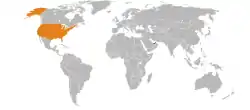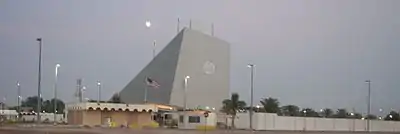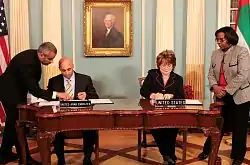United Arab Emirates–United States relations
United Arab Emirates–United States relations are bilateral relations between the United Arab Emirates and the United States of America. The United Arab Emirates has been described as the United States' best counter-terrorism ally in the Gulf by Richard A. Clarke, the U.S.national security advisor and counter-terrorism expert. In terms of defense, the United Arab Emirates Armed Forces has been nicknamed "Little Sparta" by United States Armed Forces Generals and U.S.secretary of defense James Mattis for its active role against extremists in the Middle East. The United Arab Emirates also hosts the only United States border preclearance in the Middle East.
 | |
United Arab Emirates |
United States |
|---|---|
| Diplomatic mission | |
| United Arab Emirates Embassy, Washington D.C. | United States Embassy, Abu Dhabi |
| Envoy | |
| Ambassador Yousef Al Otaiba | Ambassador John Rakolta |
Diplomatic relations
.jpg.webp)

The United States was the third country to establish formal diplomatic relations with the UAE and has had an ambassador resident in the UAE since 1974. The two countries have enjoyed friendly relations with each other and have developed strong government-to-government ties including a close security cooperation. The quality of U.S.-UAE relations increased dramatically as a result of the U.S.-led coalition's campaign to end the Iraqi occupation of Kuwait. UAE ports host more U.S. Navy ships than any port outside the U.S.
In the 2016 United States presidential election, the U.S.Justice Department accused George Nader of providing $3.5 million in illicit campaign donations to Hillary Clinton before the elections and to Donald Trump after he won the elections. According to The New York Times, this was an attempt by the government of United Arab Emirates to influence the election.[1]
Leading the UAE Embassy in Washington, DC is Ambassador Yousef Al Otaiba, who presented his credentials in July 2008.
In December 2018, the UAE reopened its embassy in Damascus to restore ties with the government of Syrian President Bashar al-Assad – a step that the UAE took against the wishes of the US. In January 2019, the UAE hosted a Syrian trade delegation that was led by a businessman, who was on U.S.Treasury sanctions list since 2011.[2]
Economical relations
US prosecutors in 2016 alleged that Dubai-based Gunes General Trading carried out suspicious transactions totaling to $142 million, using the UAE financial system during 2011 and 2012, the BBC found and reported on 20 September 2020. U.S.prosecutors accused the Dubai-based trading firm of being part of a network that was under the control of Turkish-Iranian gold trader, Reza Zarrab. The network allegedly coordinated the transaction worth millions of dollars for the Iranian government and other US-sanctioned entities belonging to Iran.[3]
On 19 August 2020, the Trump administration sanctioned two companies registered in the United Arab Emirates over their work for Iranian airline, Mahan Air. The airline has been subject to U.S.counter terrorism sanctions since 2019 for its support to Iran's Islamic Revolutionary Guard Corps, which the State Department has designated as a foreign terrorist organization. The sanctions targeted UAE-based Parthia Cargo and Delta Parts Supply, along with Parthia's owner, Amin Mahdavi.[4]
Bilateral Nuclear Cooperation Agreement
On January 15, 2009, Sheikh Abdullah bin Zayed Al Nahyan, Foreign Minister of the United Arab Emirates, and U.S. Secretary of State Condoleezza Rice signed a bilateral agreement for peaceful nuclear cooperation that enhances international standards of nuclear non-proliferation.[5]
President Barack Obama subsequently endorsed the agreement and submitted it to Congress on May 20, 2009 for the mandatory 90-day review.[6] After a hearing on Capitol Hill in July 2009, leaders of the House Foreign Affairs and Senate Foreign Relations Committees issued resolutions supporting the US-UAE nuclear cooperation agreement."[7]
Military

The United States maintains three military bases in the United Arab Emirates. The three bases are Al Dhafra Air Base, Al Minhad Air Base, and the Fujairah Naval Base. A major military hospital modeled on the major American medical facility in Germany, Landstuhl Regional Medical Center, is also being built in the UAE which will be operated by the United States Army, United States Department of Defense, and the United Arab Emirates Armed Forces.[8]
According to Richard A. Clarke, then U.S.National Coordinator for Security, Infrastructure Protection and Counter-terrorism and a contributor in the 9/11 Commission Report, the UAE is the United States best counter-terrorism ally in the Gulf.[9] According to previous U.S.ambassador to UAE Richard G. Olson, Deputy Commander of the UAE Armed Forces Mohammed bin Zayed Al Nahyan structured the UAE Armed forces to be closely aligned with the U.S.military.[10]
The United Arab Emirates Armed Forces is the only Arab country to commit military troops for humanitarian aid missions in the US-led War in Afghanistan. The UAE military is nicknamed as "Little Sparta" by United States Armed Forces Generals and specifically by former U.S.defense secretary James Mattis due to its active and effective military role, particularly in the War on Terrorism, despite its small active personnel.[11] Mattis has also called the UAE led 2016 Battle of Mukalla operation a model for American troops, referencing how the United Arab Emirates Armed Forces liberated the port of Mukalla from Al-Qaeda in the Arabian Peninsula forces in 36 hours after being held by AQAP for more than a year.[12] Prior to joining the Trump administration, Mattis received permission from the U.S.military after retiring from the Marine Corps to work as a military adviser to the United Arab Emirates Armed Forces.[13]
The United Arab Armed Forces also receive defense advice from two former top U.S.military commanders, former Secretary of Defense James Mattis and General John R. Allen, a retired United States Marine Corps four-star general and former commander of the NATO International Security Assistance Force.[14]
On 4 February 2019, a CNN investigation found out that the U.S.weapons, which were sold to UAE and Saudi Arabia, ended up in the hands of al Qaeda fighters, hardline Salafi militias and other militants waging war in Yemen. The investigation also unveiled that UAE and Saudi Arabia used the US-made weapons in form of currency to buy the loyalties of militias.[15]
Through a partnership with the United States, the United Arab Emirates has spearheaded an active role fighting against AQAP and ISIL-YP in Yemen.[16] On 26 February 2019, U.S.president Donald Trump publicly thanked the United Arab Emirates on his Twitter for the UAE's effort in rescuing Danny Burch, a U.S.citizen who was held in captivity for 18 months by militants in Yemen.[17] In late 2020, it was reported that the Trump administration would sell the UAE an estimated $10 billion of F-35 jets and $2.9 billion of armed MQ-9B drones.[18][19]
Based on a November 2020 report by Amnesty International, United States’ decision to sell 18 armed MQ-9B aerial drones worth approximately $2.9 billion to the United Arab Emirates could result in increasing civilian deaths in Yemen and Libya. Since March 2015, UAE, as part of the Saudi-led coalition has carried out several air strikes in Yemen. Amnesty International has visited and investigated dozens of sites in eight governorates, targeted in UAE air strikes as part of the Saudi-led coalition, and repeatedly found remnants of munitions manufactured by the United States. [20] On 10 November 2020, Donald Trump’s administration formally notified the Congress regarding the pending sale of 50 stealth F-35 fighter jets to the United Arab Emirates, as a part of the US’ broad arms deal worth $23 billion. The deal included 50 F-35s, 18 advanced armed drone systems and a package of air-to-air and air-to-ground munitions. The F-35 sale to the UAE raised concerns, as its military capability was already one of the most advance in the Middle East, which was evident in the Emirates’ involvement in the active conflict zones like Yemen, Syria and Libya.[21][22]
The Senate Appropriations Committee demanded the State Department to ensure that the F-35 deal with the United Arab Emirates must not threaten Israel's military edge or make U.S. military systems vulnerable to military threats posed by Russia and China.[23] In a report published by the Amnesty International on 9 November 2020, possible threats linked to Washington selling advanced weaponry and aircraft to the UAE were cited, in light of the Gulf nation's breach of arms embargo in Libya and international humanitarian law in Yemen.[24]
On 30 November 2020, a group of 29 non-governmental organizations undersigned a letter written to the Congress and State Department to halt a proposed $23 billion arms sale to the United Arab Emirates, which included advanced F-35 fighter jets, armed drones and bombs. According to the letter the key reason to demand blocking this deal was the civilian casualties caused by the UAE's intervention in Libya and Yemen.[25]
United States border pre-clearance
.jpg.webp)
The United Arab Emirates is one of the few countries and the only one in the Middle East which has a U.S.border pre-clearance that are staffed and operated by U.S. Customs and Border Protection (CBP) officers, allowing travelers from Abu Dhabi International Airport to reach the United States as domestic U.S.travelers. The U.S. customs pre-clearance facility at Abu Dhabi International Airport officially opened on January 26, 2014.[26] U.S. customs pre-clearance is currently being planned at Dubai International Airport.[27]
Intelligence
According to Reuters, U.S.intelligence operatives from the National Security Agency (NSA) helped the United Arab Emirates National Electronic Security Authority (NESA) engage in surveillance of terrorists, other governments, militants, human rights activists, and dissidents in a collaborative project called Project Raven. The project helped break up an ISIS network within the Emirates as well as assess if other attacks were imminent after the ISIS inspired Murder of Ibolya Ryan in Abu Dhabi. According to Lori Stroud, one of the former NSA intelligence analysts, Americans were also targeted for surveillance.[28] The New York Times reported that as a result, Mozilla rejected Abu Dhabi-based cybersecurity firm DarkMatter – linked to Project Raven – from administering online website security certificates.[29]
The United States Central Intelligence Agency does not gather human intelligence about the UAE as it does on almost every other nation where the United States has significant interests.[30]
Sister-Twinning cities
See also
References
- "Indictment Details How Emirates Sought Influence in 2016 Campaign". The New York Times. December 5, 2019.
- "Syrian businessman on U.S.sanctions list hosted by UAE". Associated Press. 2019-01-22. Retrieved 22 January 2019.
- "FinCEN Files: UAE central bank failed to prevent sanctions evasion". BBC. Retrieved 20 September 2020.
- "U.S. imposes sanctions on two UAE-based companies for aiding Iran's biggest airline". CNBC. Retrieved 19 August 2020.
- "The United Arab Emirates and the United States Sign Bilateral Agreement for Peaceful Nuclear Energy Cooperation". www.uae-embassy.org. Archived from the original on January 26, 2009. Retrieved 2009-02-02.
- White House: Office of the Press Secretary Press Release
- House Committee on Foreign Affairs, July 14, 2009 Archived October 7, 2009, at the Wayback Machine
- Sanderson, Daniel (18 February 2019). "UAE and U.S.to build major military hospital in Abu Dhabi".
- "9/11 Commission Report" (PDF). 9/11 Commission Report. p. 138.
- "Scenesetter for the President's meeting with Shaykh Mohammed Bin Zayed". WikiLeaks. 31 August 2009. WikiLeaks cable: 09ABUDHABI862. Retrieved 17 November 2018.
- "In the UAE, the United States has a quiet, potent ally nicknamed 'Little Sparta'". The Washington Post. Retrieved 15 September 2018.
- "US-UAE counter-terrorism operations on the rise in Yemen". The National. 15 March 2018.
- "First on CNN: Mattis advised UAE military before joining Trump administration". CNN. 2 August 2017.
- D. Kirkpatrick, David (2 June 2019). "The Most Powerful Arab Ruler Isn't M.B.S. It's M.B.Z." The New York Times.
- "Sold to an ally, lost to an enemy". CNN. Retrieved 4 Feb 2019.
- Ardemagni, Eleonora (28 July 2016). "Uae's military priorities in Yemen: Counterterrorism and the South". .ispionline.it.
- "Donald Trump thanks UAE for aiding in Yemen hostage release". The National. 26 February 2019.
- Hansler, Jennifer; Qiblawi, Tamara (6 November 2020). "Trump administration moves forward with $2.9 billion drone sale to UAE, source says". CNN. Retrieved 2020-11-07.
- "Exclusive: Trump administration advances $2.9 billion drone sale to UAE - sources". Reuters. Retrieved 5 November 2020.
- "Arms Sales to the UAE could make U.S. responsible for more deaths of civilians in Yemen and Libya". Amnesty International. Retrieved 9 November 2020.
- "US plans sale of F-35 fighter jets to UAE in $23B arms deal". AP News. Retrieved 10 November 2020.
- "Even Without F-35s The UAE's Military Packs A Big Punch For Its Small Size". Forbes. Retrieved 9 November 2020.
- "In F-35 sale to UAE, Senate seeks State Dept. guarantee for U.S.technology and Israel". Defense News. Retrieved 14 November 2020.
- "ARMS SALES TO THE UAE COULD MAKE U.S. RESPONSIBLE FOR MORE DEATHS OF CIVILIANS IN YEMEN AND LIBYA". Amnesty International. Retrieved 9 November 2020.
- "International Coalition of NGOs Calls on the United States to Immediately Halt Proposed Arms Sales to the UAE". POMED. Retrieved 30 November 2020.
- "U.S.Customs pre-clearance facility opens in UAE". Yahoo! News Philippines. January 28, 2014. Retrieved April 12, 2014.
- "U.S.border pre-clearance facility planned in Dubai". Yahoo! News Philippines. February 15, 2014. Retrieved April 12, 2014.
- Inside the UAE’s secret hacking team of American mercenaries, Reuters, 30 Jan 2019
- "Mozilla Blocks UAE Bid to Become an Internet Security Guardian After Hacking Reports". The New York Times. Retrieved 9 July 2019.
- "Why the CIA dosent spy on the UAE". Reuters. 26 August 2019.
- Abu Dhabi, Houston to sign 'Sister City' pact UAE – The Official Web Site – News Archived 31 October 2009 at the Wayback Machine. Uaeinteract.com. Retrieved 16 July 2009.
- Sister Cities Agreement between Detroit and Dubai Archived 22 December 2015 at the Wayback Machine, 28 September 2003.
![]() This article incorporates public domain material from the United States Department of State website https://2009-2017.state.gov/r/pa/ei/bgn/5444.htm#relations.
This article incorporates public domain material from the United States Department of State website https://2009-2017.state.gov/r/pa/ei/bgn/5444.htm#relations.
